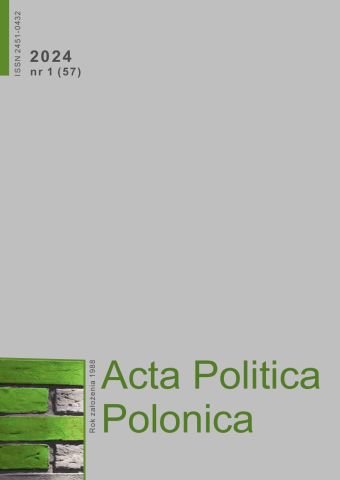
ISSN: 2451-0432
eISSN: 2719-4388
OAI
DOI: 10.18276/ap.2024.57-07




Lista wydań /
1/2024 (57)
‘Ilemosu’ social stigma and desire for remarriage among female divorcees in Akinyele Local Government Area of Oyo State, Nigeria
| Autorzy: |
Remi Kasali
Alatise

Department of Sociology and Industrial Relations Fountain University Osogbo, Nigeria Tajudeen Yusuf Adeyinka 
Department of Criminology and Security Studies National Open University of Nigeria, Abuja, Nigeria Musediq Olufemi Lawal 
Department of Sociology and Criminology Osun State University, Osogbo, Nigeria Kehinde Monsurat Raji Department of Sociology and Industrial Relations Fountain University Osogbo, Nigeria |
| Słowa kluczowe: | divorce marrying remarrying residents yoruba ‘Ilemosu’ |
| Data publikacji całości: | 2024-05 |
| Liczba stron: | 20 (99-118) |
Abstrakt
Divorce is generally loathsome among the Yoruba people as it is morally reprehensible and socially stigmatized. Most women divorcees are derisively called ‘dalemosu’, a term that represents failures in nuptial affairs and lack of capacity to manage marital crisis. To obliterate or counteract the social disapproval and stigmatization attached to divorce, many victims attempt to enter into another conjugal relationship, while others may never care about the disdain with the warped notion that marriage presents lots of injustices, especially for women. They instead prefer finding solace in single parenthood. Notions that “all men are the same” and “marriage is for the lucky ones” were identified as strong factors that made a number of divorcee participants to lose confidence in institution of marriage
Pobierz plik
Plik artykułu
Bibliografia
| 1. | Anderson, J. (2014). The impact of family structure on the health of children: Effects of Divorce. Linacre Quarterly, 81 (4), 378–387. |
| 2. | Aroh, A. (2021). Occupational correlates of marital dysfunction among dual easterner couples in Enugu State. Unpublished doctoral dissertation. Nsukka: University of Nigeria. |
| 3. | Arowolo, D. (2022). On becoming a divorcee in Ekiti: Implication for counselling. Unpublished master’s thesis. University of Ibadan. |
| 4. | Dohrenwend, B., Dohrenwend, B. (eds.) (2004). Stressful life events: their nature and effects. New York: John Wiley & Sons. |
| 5. | Epstein, J. (2012). Divorce: The American experience. London: Jonathan Cape. |
| 6. | Hally, R., Hoffin, R. (2015). Teenage marriage and marital breakdown. A longitudinal study. Population Studies. Journal of Demography, 40, 35–54. |
| 7. | Holemsand, H., White, W. (2015). The Social Readjustment Scale. Journal of Psychosomatic Research, 33, 58. |
| 8. | Hornby, A. (ed.) (2018). Oxford advanced learner’s dictionary of current English (5th ed). Great Clarendon: Oxford University Press. |
| 9. | Jamshidi, M., et al. (2015). The effectiveness of functional empowerment of couple’s Islamic based approach on women marital satisfaction. Women and Family. 10, 7–35. |
| 10. | Jebraeili, H., Zadeh Mohammadi, A., Heidari, M. (2013). Gender differences in mate selection criteria. Journal of Family Research, 9 (34), 156–171. |
| 11. | Keshavarz M., Shariati, M., Ebadi, A., Moghadam, Z. (2018). Desire and attitude to marriage among unmarried Iranian youth: A qualitative study. International Journal of Women’s Health and Reproduction Sciences, 6 (4), 425–431. |
| 12. | Mgbodile, T. (2020). African wisdom. Enugu: MBE Publishers. Mirror, C. (2013). Divorce and the Divorcees: Social Implication on the Society. Lagos: Life Press Limited. |
| 13. | Mohammadi, A., et al. (2016). A qualitative exploration of married student’s attitudes toward marriage. International Journal of Life Sciences, 10 (1), 51–57. |
| 14. | Mutlu, B., et al. (2018). A review on the relationship between marital adjustment and maternal attachment. Revista da Associação Médica Brasileira, 64 (3), 243–252. |
| 15. | Okoh, O. (2014). Decreasing the divorce rate in our society. Sunday Statesman, 4–5. |
| 16. | Omeje, J. (2020). Educational and occupational information in counselling: A fundamental approach. Obollo: Chidube Printing Press Company. |
| 17. | Parhizgar, O., Esmaelzadeh-Saeieh, S., Akbari, M., Rahimzadeh, M., Tehranizadeh, M. (2017). Effect of premarital counselling on marital satisfaction. Shiraz E Medical Journal, 18 (5). DOI: 10.5812/semj.44693. |
| 18. | Sadrolashrafi, M., et al. (2011). Identifying factors influencing easy marriage from the point of view of female students of Payam-e Noor Zaheri et al University, Razan branch. Mohandesi Farhangi, 7 (6970), 86–101. |
| 19. | Saei, M., Ozgoli, G., Hajizadeh, F., Nasiri, M. (2017). Comparative study of childbearing pattern in women with marital satisfaction and marital dissatisfaction. Evidence Based Care, 3, 71–75. |
| 20. | Valadkhani, M., Mahmoudpour, A., Farahbakhsh, K., Salimi, H. (2017). The effects of partner-selection patterns, marriage age, and age differences between spouses on marital quality of married women in Tehran. Clinical Psychology Studies, 25, 173–190. |
| 21. | Zare, B. Safiyari, H. (2015). The study of marital satisfaction and its determinants on married women and men in Tehran city. Quarterly Journal of Women’s Studies Sociological and Psychological, 13 (1), 111–140. |